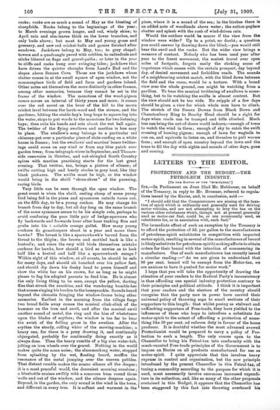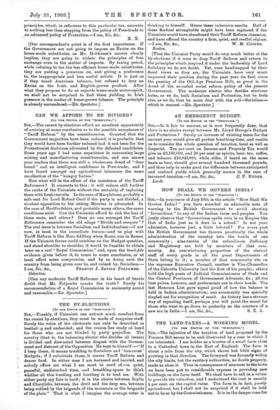LETTERS TO THE EDITOR.
PROTECTION AND THE BUDGET.—THE PETROLEUM INDUSTRY.
[TO TOR EDITOR OV TIIR "SPECTATOR:1
SIR,—In Parliament on June 22nd Mr. Hobhouse, on behalf of the Treasury, in reply to Mr. Brunner, referred to regula- tions issued by the Excise, and, in conclusion, said :— "I should add that the Commissioners are aiming at the taxa- tion of spirit which is ordinarily and generally used for driving motor vehicles, and are not attempting to levy the tax on the various other substances which, though not at present generally used as motor-car fuel, could be, or are occasionally used, as substitutes for, or in association with, such fuel."
The immediate effect of such an exception by the Treasury is to afford the protection of 3d. per gallon to the manufacturers of petroleum-spirit substitutes in competition with imported motor-spirit, resulting in several of the manufacturers of benzol (a likelysubstitute for petroleum-spirit) making efforts to obtain orders for their benzol with the intention of commencing its manufacture. One of such manufacturers has recently issued a circular reading :—" As we are given to understand that 90 per cent. benzol will be exempt from the Motor-tax, wo are anxious to have it pushed for motor work."
I hope that you will take the opportunity of drawing the attention of your readers to the Radical Party's inconsistency in thus affording one special industry protection contrary to their principles and political attitude. I think it is important that your readers and the electors of the country should recognise that the party now in power have carried their universal policy of throwing sops to small sections of their supporters to this length : that whilst posing as stalwart and unflinching supporters of Free-trade, they have yielded to the influences of those who hope to introduce a substitute for motor-spirit to the extent of affording a protection of some- thing like 50 per cent. ad valorem duty in favour of the home producer. It is doubtful whether the most advanced avowed Protectionist would be prepared to carry a policy of Pro-
tection to such a length. The only course open to the Chancellor to bring his Petrol-tax into conformity with the much-vaunted Free trade principles of the Government is to impose an Excise on all products manufactured for use as motor-spirit. I quite appreciate that this involves heavy experise in control and organisation, but the new principle introduced by the present Chancellor in this Petrol-tax, of taxing a commodity according to the purpose for which' it is used, must necessarily involve enormous increased expendi- ture in its collection, and, like so many' of the other propOsals contained in this Midget, it appears that the Chancellor has been staggered by this fact into throwing overboard his . principles; which, in reference to this particular tax, amounts to nothing less than stepping from the policy of Free-trade to , an advanced policy of ProtectiOn.—I am, Sir, &c.,
X. X.
[Our correspondent's point is of the first importance. If the Government are not going to impose an Excise on the home-made substitutes, as Mr. Hobhonse's answer clearly intplies, they are going to violate the principles of free exchange even in the matter of imports. By taxing petrol, while refusing to tax the less efficient home-made substitutes, they are putting a premium on, and giving a preference to, the inappropriate and less useful article. It is just as if they taxed American tobacco, but refused to levy an Excise on the Irish- and English-grown product. After what they propose to do as regards home-made motor-spirit, we shill not be surprised to find them yielding to Irish pressure in the matter of home-grown tobacco. The principle is already surrendered.—ED. Spectator.]







































 Previous page
Previous page